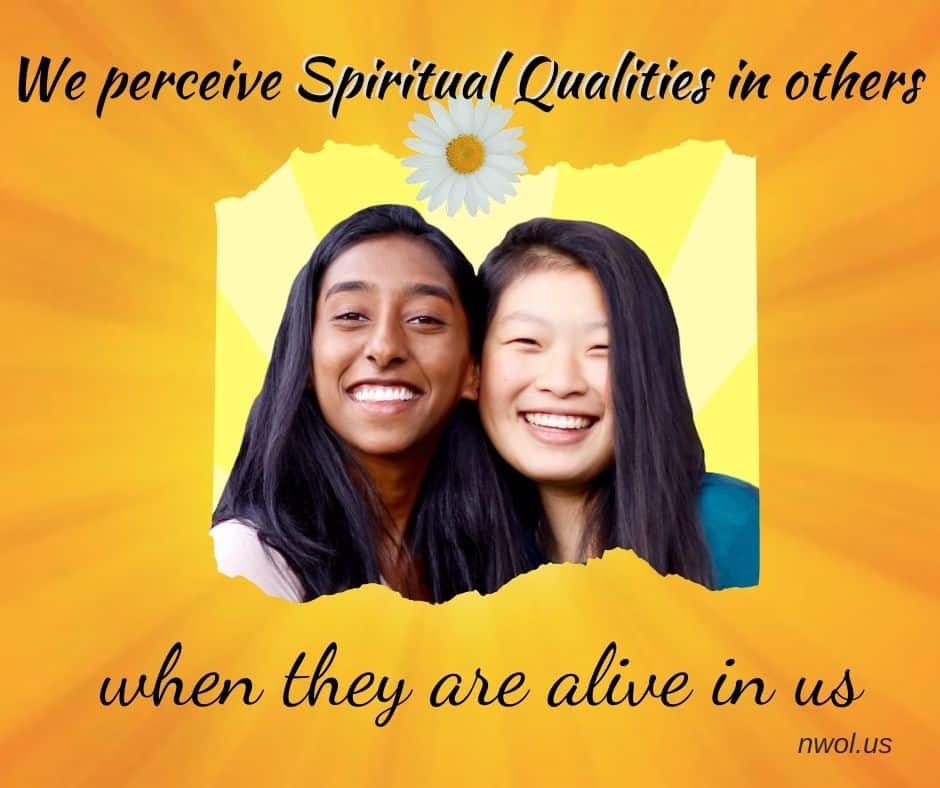In the examination of Bahá’í teachings, the question of the origin of our spiritual qualities engenders profound exploration. Central to this inquiry is the understanding that spiritual qualities are inherent attributes of the human being, cultivated through various means. The Bahá’í perspective emphasizes the interconnectedness of humanity and the divine, suggesting that spiritual qualities emanate from a confluence of divine attributes, personal endeavor, and communal interaction.
Traditionally, Bahá’í teachings advocate that each person is endowed with innate potentialities that reflect the divine. These qualities, such as love, compassion, kindness, and justice, are not merely aspirations; they are inherent aspects of our being bestowed by our Creator. As Bahá’u’lláh explains, “The divine reality, revealed in the sacred scriptures, imbues humanity with spiritual potential.” This proposition leads to a deeper investigation into sources of spiritual nurturance.
One of the primary avenues through which individuals cultivate these spiritual qualities is through prayer and meditation. Regular engagement in prayer establishes a conduit to the divine, facilitating an infusion of spiritual attributes into daily life. Such practices are not merely ritualistic; they serve to align the spirit with higher realities. Indeed, meditation fosters reflection, allowing individuals to examine their inner selves and to cultivate qualities such as patience and humility. As one immerses oneself in the depths of contemplation, the transformative power of these spiritual practices manifests, leading to a higher state of consciousness.
In the Bahá’í faith, the importance of community cannot be understated. Spiritual qualities are often developed in communal settings, where individuals uplift one another. The Bahá’í community is characterized by a spirit of unity and collective action, creating an environment conducive to the growth of these attributes. Engaging with others allows for the exchange of ideas, experiences, and emotions, engendering empathy and mutual respect. “The foundation of the Bahá’í community is laid upon the principle of unity in diversity,” which is vital for understanding how we can cultivate spiritual qualities by learning from one another.
Moreover, service to humanity emerges as a critical avenue for developing spiritual qualities. Actively participating in acts of kindness and selflessness allows individuals to embody the very virtues they aspire to cultivate. The Bahá’í teachings posit that service is a pathway to spiritual enlightenment. “In the service of others, one can discover the essence of their own potential,” as the self gradually diminishes in favor of an expanded awareness of the interconnectedness of all life. This selfless orientation fosters virtues such as generosity and sacrifice, integral components of a spiritually enriched life.
The Bahá’í writings elucidate the interconnectedness of learning and spirituality. Engaging in the pursuit of knowledge—both material and spiritual—serves to elevate the understanding of oneself and others. Through the acquisition of knowledge, individuals refine their character and develop critical discernment. This intellectual engagement further enables believers to navigate the complexities of life while adhering to the principles and teachings of their faith. Knowledge can thus be perceived as instrumental in the cultivation of spiritual qualities, fostering a comprehensive worldview that embraces compassion and justice.
Another significant aspect of spiritual development within the Bahá’í framework is the role of personal reflection and accountability. Individuals are encouraged to engage in self-examination, discerning their strengths and weaknesses. This process of self-reflection cultivates qualities such as humility and sincerity, essential for spiritual growth. “To advance on the path of spiritual transformation, one must acknowledge their shortcomings and strive towards perfection.” This continual process of introspection facilitates a journey toward greater self-awareness and alignment with divine attributes.
Furthermore, the role of divinely appointed leaders and teachers within the Bahá’í faith provides additional guidance on the path to spiritual enhancement. The teachings of Bahá’u’lláh, along with those of ‘Abdu’l-Bahá and Shoghi Effendi, serve as guiding lights, offering profound wisdom that elucidates the paths towards developing one’s spiritual qualities. Their examples and teachings provide a framework for understanding how one can emulate divine attributes in everyday life.
Additionally, the Bahá’í emphasis on the importance of consultation offers an essential means of refining spiritual qualities. Engaging in thoughtful dialogue with others creates a rich tapestry of perspectives that enhances understanding and harmony. During these consultations, individuals are encouraged to approach discussions with open hearts and minds, allowing for the emergence of collective wisdom. This practice fosters virtues such as tolerance and understanding, essential for thriving in a diverse and interconnected world.
In conclusion, the Bahá’í teachings present a comprehensive understanding of where our spiritual qualities originate. From the cultivation of inner attributes through prayer and community engagement to the pursuit of knowledge and service, these avenues collectively nurture the inherent potential within each human being. The Bahá’í faith exemplifies a holistic approach to spiritual development, where individual growth harmoniously intertwines with collective progress. It is through such endeavors that believers strive to embody the divine qualities bestowed upon humanity, actively participating in the betterment of the world and the fulfillment of the ultimate purpose of life.
